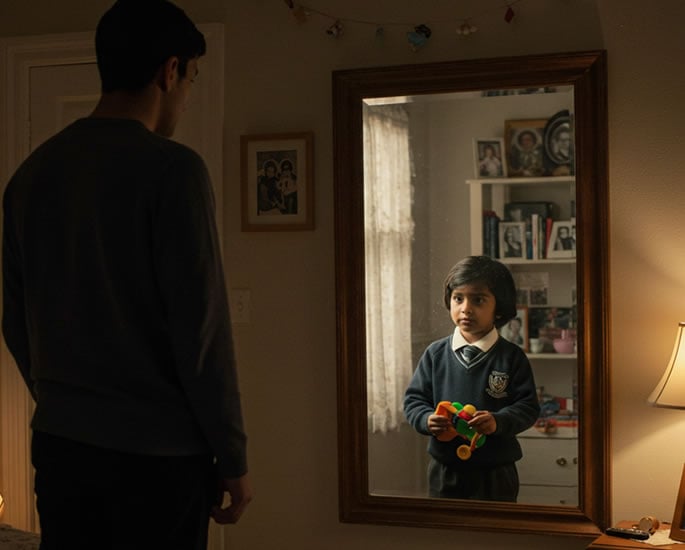Parenting offers a chance to break cycles.
In many British South Asian households, the question isn’t if you’ll have children, but when.
It’s asked casually over chai at family functions or with a raised eyebrow after your wedding, but beneath that question lies generations of cultural expectation.
Having children isn’t just a personal milestone; it’s a societal standard deeply embedded in South Asian culture.
The expectation to have children by a certain age or soon after marriage is seen less as a choice and more as tradition, though that narrative is slowly being challenged.
Becoming a parent is one of the most life-altering decisions you’ll ever make. And while the pressure to start a family can feel inevitable, what if we gave ourselves the space to pause, question, and reflect?
Here are 10 important things to consider before stepping into parenthood, especially in a world where family, culture, and tradition often weigh just as heavily as love and longing.
Define your ‘Why’

For many British South Asians, the expectation to want children is automatic. You get married, settle down, and the next step is obvious.
But, ask yourself: Why do you want children?
Is it to build a family of your own, pass on your values, or experience a deeper kind of love? Or is it because your parents expect grandchildren, or because it’s what everyone else around you is doing?
Take time to explore your motivations. Parenthood is a lifelong commitment, not a cultural checkbox.
London-based marketing manager Ria said:
“Truthfully, I can’t think of a reason to have kids.
“We don’t feel incomplete without children. Our lives are full, joyful, and deeply connected. That is enough for us.”
Many couples find that open conversations about starting a family are essential, grounded in trust, understanding, and a shared vision for the future.
Prepare for an Identity Shift

When a baby is born, so is a mother and a father. You don’t just add a new role; you reshape who you are.
This shift can be beautiful, but it’s also disorienting.
Suddenly, your time, energy, and even your name (“Mum” or “Dad”) belong to someone else. You may grieve your old life even as you celebrate your new one, and this is very normal.
For many British South Asians, this also means navigating how you’re seen within your extended family.
Cultural ideals around the “perfect mother” or “provider father” can weigh heavily, particularly when gender roles are deeply embedded.
This shift isn’t just practical, it’s emotional, psychological, and personal. Make space for that complexity.
Reflect on Your Own Childhood

Generational trauma is something our community is only just beginning to unpack. The way we were raised, often shaped by immigrant struggles, still influences how we parent today.
Born in the 70s-90s in a South Asian household?
Then you may recognise this: parents working non-stop, “thapars” (slaps), forbidden dating, modest dress codes, boys valued more than girls.
But just because it was normalised doesn’t mean it was healthy. And it doesn’t mean it needs to continue.
Parenting offers a chance to break cycles.
But it starts with awareness. Healing your own inner child through therapy, reflection, or honest conversations can shift how you approach discipline, affection, and emotional safety.
This kind of reparenting isn’t easy. But it’s one of the most powerful gifts you can offer your future child.
Understand the Physical and Emotional Toll

Pregnancy changes your body and not always in ways that are discussed openly.
From weight gain and stretch marks to hair loss, pelvic floor issues, and chronic fatigue, the physical effects can be long-term. And it doesn’t end with birth.
Hormonal shifts, sleep deprivation, and mental health challenges are common, yet still taboo in many South Asian households.
There’s often an expectation to “bounce back”, but many women are now choosing to honour their bodies for what they’ve endured rather than how quickly they recover. Strength and softness can co-exist.
These changes deserve more than a passing mention. They deserve support, care, and honest conversations, especially with your partner.
Consider the Financial Reality

The cost of raising a child in the UK is steep.
According to the Child Poverty Action Group, it now costs up to £260,000 for a couple to raise a child to age 18, more for single parents. That’s before you factor in unexpected medical bills, housing costs, or private childcare.
In British South Asian communities, financial support often comes from family, such as grandparents, but what if that support isn’t available or comes with expectations?
You’ll need to consider maternity/paternity pay, potential loss of income, and the affordability of childcare.
In some cases, grandparents help raise the children. But in others, parents are left to navigate everything alone while still being expected to maintain appearances.
Is your household income ready to support another life? And what sacrifices are you willing to make?
Explore Your Parenting Style

Will you raise your children the way you were raised?
From authoritative to gentle parenting, there are many approaches, and your style can directly shape your child’s emotional wellbeing.
But for British South Asian families, the real challenge often lies in negotiating between generations.
You may want to prioritise empathy and autonomy, but your parents may expect strict discipline and obedience. These clashes are common, and they can lead to uncomfortable conversations.
Talking about parenting styles with your partner (and even your in-laws, if appropriate) can help reduce tension down the line.
The key is consistency, open dialogue, and a shared understanding of what’s best for your child, not just what’s familiar.
Division of Labour

Who will take the night feeds? Who tracks the doctor’s appointments, books the nursery, or packs the nappy bag before a family wedding?
These aren’t just chores, they’re part of the invisible load many mothers carry, particularly in traditional households.
British South Asian culture can still cling to the idea that child-rearing is a woman’s role. But this mindset leaves women exhausted and men disconnected.
Real partnership means sharing both visible and invisible labour.
And legally, things are shifting. As of June 2025, UK couples can use Shared Parental Leave, offering more flexibility around who takes time off.
Traditionally, women have been expected to stay at home to look after the children, but this may not make financial sense.
If the mother is earning more, some households swap their parental leave to better suit their situation.
Jiten, a father of two from Birmingham, said:
“I felt so disconnected with my first child, I missed out on so much as I was constantly travelling for work.”
“We had our second child during Covid, and while my work scaled back, my wife’s industry was in demand. We decided I would raise the children as she returned to work.”
While it may feel taboo to challenge the traditional patriarchal model of the South Asian family, deciding who becomes the stay-at-home parent often comes down to practicalities.
Consider Career Impact

For many British South Asian women, balancing ambition with motherhood feels like an impossible tightrope.
Regardless of shared parental responsibilities, generally, most mothers are the ones who feel the biggest impact on their careers during motherhood compared to fathers.
Ask yourself: Will you pause your career? Will your workplace support your return? And what happens to the version of yourself you spent years building?
Some families assume the woman will step back, especially in traditional households. But this assumption can come at a cost: to identity, income, and long-term opportunity.
More companies now offer phased returns, flexible hours, and remote working policies. Men are also beginning to challenge outdated expectations and take a more active parenting role.
Still, the decision to step away or not is different for everyone. Whatever you choose, make sure it’s a decision shaped by your needs, not just social norms.
Establish a Support System

Raising a child isn’t a solo mission. And yet, many couples, especially those living away from extended family, find themselves doing it alone.
Traditionally, British South Asian families have relied on tight-knit networks of grandparents, aunties, and cousins. The ‘village’ that helped raise your child no longer exists.
Support can look different for everyone.
This may be a friend who drops off food, a therapist who helps you navigate anxiety or a group chat with other new parents.
The key is knowing what kind of support you’ll need and being willing to ask for it.
Let the Decision Be Yours

There’s no perfect time, plan, or formula for becoming a parent. What matters most is that the choice of whether to have children or not comes from a place of self-awareness, not pressure.
For many British South Asians, challenging cultural expectations can feel like rebellion.
Saying “no”, delaying parenthood, or choosing adoption over childbirth may go against the grain, but these are all valid paths.
And if you change your mind later in life?
When asked about her future, Ria shared:
“There isn’t only one route in life.
“One day, I may give my energy to children who are homeless, orphaned, or wishing for an education.”
You don’t have to follow anyone else’s timeline. Becoming a parent isn’t just about raising a child; it’s about becoming the kind of person ready to love, guide, and nurture another human being.
There is no perfect moment to have a child and no universal checklist that guarantees readiness. But asking the right questions can help you move forward with greater clarity and confidence.
In British South Asian communities, where tradition often speaks louder than individual desire, choosing when or whether to become a parent can feel like a quiet act of rebellion.
But it’s also an act of care.
The pressure will always be there at weddings, in WhatsApp chats, across dining tables thick with expectation. But only you can decide what’s right for your life.
And perhaps the most loving thing you can do, before raising a child, is to first raise the courage to choose your own path.






























































